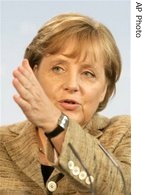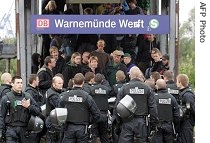2007年VOA标准英语-G8 Leaders Gather Amid Differences and Protests(在线收听)
Heiligendamm, Germany
05 June 2007
Leaders of the G8 group of major industrial nations are gathering in Germany's Baltic Sea resort of Heiligendamm for three days of discussions to include climate change, economic issues and debt relief for Africa. But differences were evident before the summit began and security was extremely tight to keep protesters away from the meeting site, as VOA's Sonja Pace reports from Heiligendamm.
The stage has been set with meticulous preparation in the traditional resort of Heiligendamm. It is here that these major world leaders will hold bilateral meetings, working lunches and dinners. There will be group photos, handshakes and smiles, but these are unlikely to fully mask underlying policy differences.
 |
| Angela Merkel, 4 Jun 2007 |
Mrs. Merkel would like to see agreement on benchmark limits to global warming, but the United States and some other countries are reluctant to commit themselves to such limits.
Speaking just days before the summit, Britain's Prime Minister Tony Blair said there is the possibility of moving forward on a global warming strategy, but he warned that all the major players must be on board.
"Unless you can get a global agreement that encompasses all the main players and that means America, obviously, but also China and India and the developing world that is as a result of its economic growth going to be emitting vastly more of the greenhouse gas emissions than before," said Blair. "Unless you can get a comprehensive global deal then we are unlikely to make progress."
And, there is no indication in Heiligendamm that all the major players agree on the issue.
Another major agenda item is aid to Africa and debt relief for the continent. The G8 members committed themselves to major aid increases and debt relief at their summit in Glen Eagles in Scotland two years ago, but experts say implementation of those promises has been sparse.
South African President Thabo Mbeki has said he hopes to see some steps forward. "What we would like to see come out of Heiligendamm is further movement forward," he said. "I do not have a sense that there is anybody among the G8 who is opposed to that and ... increased aid from the U.S. and Germany that have been announced in the last few days - I think are a signal of that kind of commitment."
Talks at the summit between U.S. President George Bush and Russian President Vladimir Putin are likely to steal the headlines. Relations have become increasingly tense over U.S. proposals to build a missile defense system in Europe that Washington says is vital to thwart possible attacks from Iran.
Mr. Putin has dismissed such reasoning and says instead that the American missile system would pose a threat to Russia. Mr. Putin threatened to aim Russian missiles at European targets if the system is built.
Speaking in the Czech capital, Prague, Mr. Bush said the Cold War is over and Russia has nothing to fear from this missile defense system. Instead, Mr. Bush said he will try to convince Mr. Putin that the U.S. and Russia can work together to deal with common threats.
 |
| Anti-globalisation protesters are stopped and searched by police as they leave the train station in the north-eastern town of Warnemuende, Germany, 05 Jun 2007 |
Clashes between police and demonstrators have already taken place in the nearby city of Rostock. An anti-summit riot on Saturday left about one thousand people injured and there are fears of further unrest.
Germany holds the G8 rotating presidency and hosts the meeting of leaders from Britain, Canada, France, Italy, Japan, Russia and the United States. They are joined by leaders from China, India, Brazil, Mexico and a number of African countries.